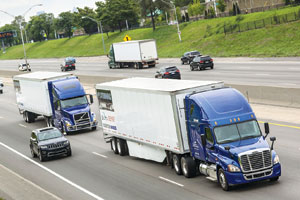Michigan House OKs Truck Platooning

The legislation now goes to Gov. Rick Snyder, who will have two weeks to decide whether to sign it after he officially receives it. Snyder is currently on a trip to China.
If Snyder signs the bill, Michigan would begin its platooning project at the planned American Center for Mobility at the site of a former General Motors plant in Ypsilanti Township.
AUTONOMOUS AUTUMN: Recent video coverage of autonomous vehicle developments
Walt Heinritzi, executive director of Michigan Trucking Association, expects Snyder to sign the platooning bill.
“The Snyder Administration is very interested in ensuring that Michigan stays at the forefront of automotive research since we are the home of the automotive industry,” Heinritzi said.
Snyder’s Michigan Economic Development Corp. has spent $20 million to help complete the Willow Run purchase. The Army conducted a platooning test on Interstate 69 in Michigan this year. Michigan Sen. Rebekah Warren, one of the sponsors of the platooning legislation, told Transport Topics in September, “Within five years, you’ll see be seeing pretty significant platooning in Michigan.”
Platooning uses wireless communication to synchronize the braking and acceleration of two trucks, enabling them to travel close enough to boost fuel economy and aerodynamics. The technology has been demonstrated recently in a number of states, but it hasn’t moved beyond the pilot stage anywhere. Missouri’s Legislature overwhelmingly approved a platooning pilot this year only for Gov. Jay Nixon veto the bill after a person was killed in a crash with a Tesla passenger car driving on autopilot.
Legislation isn’t needed in some states because they don’t have rules on following distance for trucks, which is typically regulated at 300 feet.
A semi-autonomous truck made history Oct. 25 by delivering more than 50,000 cans of beer, using Otto’s fully autonomous technology for 120 miles of the 133-mile trip in Colorado.

